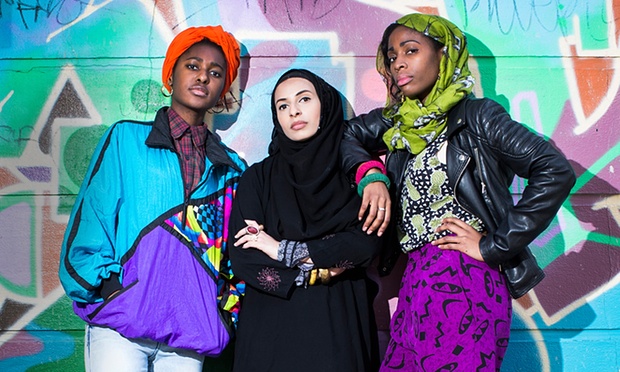Hannah Ellis-Petersen Guardian
A controversial play exploring the motives behind radicalised young people joining Islamic State has been cancelled less than a fortnight before its opening night, with the creators claiming the voices of the young cast have been “silenced”.
Homegrown, a National Youth Theatre (NYT) production, was closed down last Thursday, with the creators saying they were given no prior warning. Director Nadia Latif and playwright Omar El-Khairy believe the production was cancelled due to external pressures, claiming both local authorities and police got involved during the development of the play.

Cast of Homegrown, left to right, Vanessa dos Santos, Humaira Wadiwala, Marilyn Nadebe Photograph: Helen Maybanks/National Youth Theatre
The play had a cast of 112 people aged between 15 and 25 who were mostly from ethnic minorities. It was originally due to take place in a school in Bethnal Green, less than a mile from the Academy attended by Shamima Begum, Kadiza Sultana and Amira Abase, the schoolgirls believed to have travelled to Syria in February to become jihadi brides and whose case first inspired the production.
Latif and El-Khairy had developed the play through workshops with the young actors, looking at the emotive issues of jihadi brides and attitudes towards Islam in the UK. Instead of being performed on stage to an audience, it was to be an immersive, promenade production, where the audiences could walk through the school corridors, witnessing conversations and different dramatic moments between the cast.
“There was no warning,” said Latif. “We got an email on Thursday night saying the show was cancelled, rehearsals are done, and the cast were told on Friday morning. And that was really a sucker punch, not least because we didn’t see it coming at all. There must have been some extraordinary external pressure to cancel the production to justify that emotional trauma on a cast of 112 young people.
“This show was about having an intelligent conversation around an issue that has hysteria attached, and instead voices have been silenced with no explanation and without the content ever being seen because of this landscape of fear that we live in.”
The controversial production first encountered difficulties in June, when they had to move the play from the school in Bethnal Green to UCL academy in Swiss Cottage, after concerns from Tower Hamlets council that it would be “insensitive”.
A spokeswoman for Tower Hamlets council said: “The school was not aware of the subject of the play when they agreed to lease the premises. Once they became aware, they decided that it would not be appropriate to rent their premises to the National Youth Theatre.”
In late July, during a production meeting, the pair claim they were also told that the police wanted to view a final draft of the script and were considering putting plain clothed police offers in the audience.
El-Khairy said: “In a production meeting we were asked by NYT and stage management that the police wanted to look at the script, though we don’t know where that came from or who led that conversation.”
NYT have claimed that the production was cancelled for quality reasons, but both Latif and El-Khairy deny any concerns had been raised previously, and are adamant that the show was in fact running ahead of schedule.
“The show was running absolutely to schedule and the script had all been signed off and we were very confident of actually being ahead of schedule,” said Latif. “So there was never any doubt of it being ready on time. No time concerns or quality concerns were raised. So when they announced it was cancelled it felt like the world falling away from under me, I just didn’t see it coming. We are just desperately seeking clarity.
“The whole point was that it was more of a kaleidoscopic exploration of the treatment of homegrown radicalisation and to explore the breadth of opinion that is out there, and that the young people find themselves subject to. To cancel it is to undermine that entirely – what message does that send these young people about the environment of fear and politics we live in?”
She added: “It is important to say, we were never opaque about what we were making. The commission came from NYT and we were always very clear that at every stage, every bit of script that we had could be read.”
“Voices have been silenced here, there is no doubts about that and I just feel like in order to make the decision to cancel it, something very extreme must have been [sic] happened” added El-Khairy.
The National Youth Theatre refused to comment on possible censorship and in a statement said: “The production of Homegrown will no longer go ahead. After some consideration, we have come to the conclusion that we cannot be sufficiently sure of meeting all of our aims to the standards we set and which our members and audiences have come to expect.”
Shami Chakrabarti, director of Liberty, said:“What can possibly have happened 10 days before the first show that led to this important and relevant piece of work to be cancelled? Only a fortnight ago the prime minister talked about engaging with young people about the seductive power of Isis – what message does shutting down this play send?’
In an interview with the Guardian in June, Paul Roseby, director of the NYT, was adamant the company were not afraid to avoid controversial questions within with the piece.
“Perhaps the end result theatrically will also divide opinion – it was ever thus,” he said. “But I think it is worth the risk because theatre is a very powerful medium to explore those issues that can make people feel uncomfortable.”

